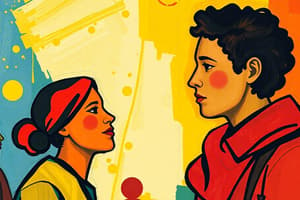Podcast
Questions and Answers
Match the following terms with their definitions:
Match the following terms with their definitions:
Representative Democracy = A system where people elect representatives to make decisions on their behalf Lobbyist = A person who advocates for a particular group or interest Accountable = A person who is responsible for their actions Petition = A document signed by many people to show support for a cause
Match the following organizations with their characteristics:
Match the following organizations with their characteristics:
MNA = Has 14 regional offices ACFA = Has 13 representatives
Match the following terms with their roles in government:
Match the following terms with their roles in government:
Representative = Elected to make decisions on behalf of the people Candidate = Runs for election to become a representative Lobbyist = Influences government decisions on behalf of a group Electorate = Voters who elect representatives
Match the following concepts with their descriptions:
Match the following concepts with their descriptions:
Match the following terms with their definitions related to government participation:
Match the following terms with their definitions related to government participation:
Match the following terms with their roles in promoting change:
Match the following terms with their roles in promoting change:
Flashcards are hidden until you start studying
Study Notes
Government and Participation
- Representative Democracy is a system where citizens elect representatives to make decisions on their behalf.
- A Lobbyist is an individual or group that tries to influence government decisions in their favor.
- Public Meeting is a gathering of people to discuss and debate issues related to government policies or decisions.
- Accountable refers to the responsibility of elected representatives to answer to the people who elected them.
Associations and Their Importance
- An Association is a group of people with similar interests or goals that work together to achieve a common objective.
- Associations are important because they provide a platform for people to come together and raise their voices on issues that affect them.
- Examples of associations include ACFA, Metis, and MNA.
Roles and Responsibilities
- A Representative is an elected official who represents the interests of their constituents in government.
- The responsibilities of a representative include listening to the concerns of their electorate, making laws, and overseeing government policies.
- A Candidate is an individual who runs for an elected office.
Participation in Government
- Electorate refers to all the people eligible to vote in an election.
- Implementation refers to the process of putting policies or laws into action.
- To be an active participant in government, citizens can engage in activities such as voting, attending public meetings, joining associations, and contacting their representatives.
Methods of Participation
- Methods of participation include voting, contacting representatives, attending public meetings, joining associations, and participating in rallies and petitions.
- A Petition is a document signed by many people to show support for a particular cause or issue.
- A Rally is a gathering of people to raise awareness and show support for a particular cause or issue.
ACFA and MNA Information
- ACFA has 14 regional offices, 13 representatives, 1 president, and 4 members, divided into 6 zones or regions.
- MNA has regions that can be identified through close reading of the textbook and may be supported by a map.
Injustice and Advocacy
- Injustice refers to unfair or unequal treatment of individuals or groups.
- An Advocate is an individual who speaks or acts on behalf of another person or group to promote their rights or interests.
- Examples of injustices include issues related to human rights, environment, and social welfare.
- Citizens can help address injustices by advocating for change, participating in peaceful protests, and supporting organizations that work towards social justice.
Studying That Suits You
Use AI to generate personalized quizzes and flashcards to suit your learning preferences.




